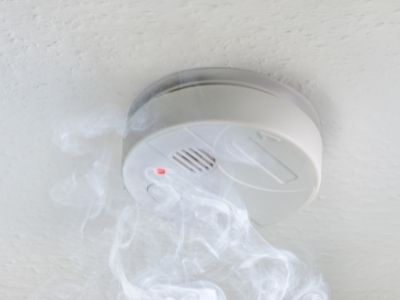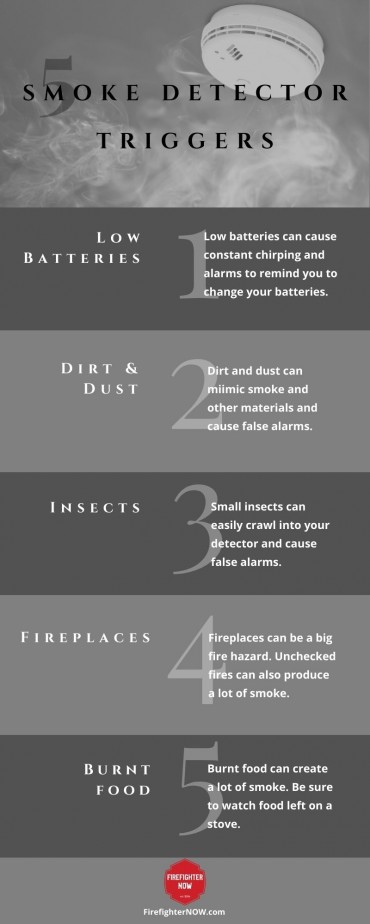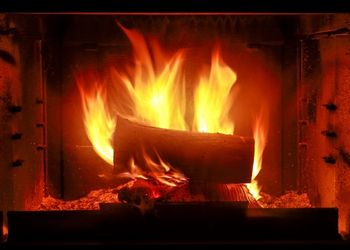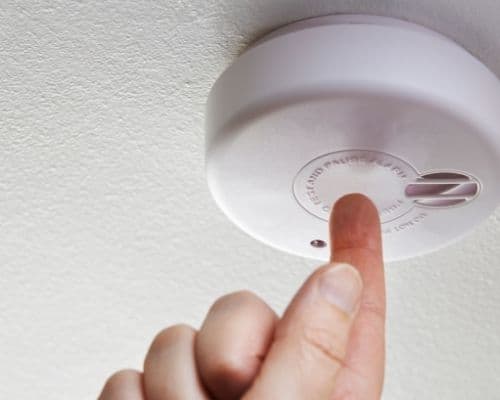The shrill beeping of your smoke detector scared you the first time it went off. Since then, its frequent blaring has started to get on your nerves. You’ve recently replaced the batteries and still, your smoke detector won’t cease. Then you have the thought that perhaps steam from the kitchen or shower is making the alarm go off. Can that happen?

Steam can set off a smoke detector. If your smoke detector is in proximity to your kitchen or bathroom, the density of the water vapor can mimic the smoke from a fire. Even humidity and dust can cause false alarms.
In today’s article, we’ll talk further about steam’s impact on most smoke detectors and what you can do to prevent your alarm from beeping incessantly. Make sure you keep reading!
Table of Contents
Why Does Steam Make Your Smoke Detector Alarm?
Smoke detectors are life-saving devices, but only when they’re working properly. When your smoke detector begins going off all the time, even when there’s not one iota of smoke in the house, it can drive you crazy.
Could it be that the harmless steam you generate in your home each time you boil food on your stove, run your dishwasher, hand-wash dishes with hot water, or take a shower is causing your smoke detector to go off?
Indeed, that very well could be the case!
To understand why that is, you must be privy to how smoke detectors work, so allow us to explain. There are two types of smoke alarms, photoelectric and ionization smoke alarms.
Photoelectric smoke alarms have a sensing chamber and a light source. The light enters the chamber at such an angle that the light faces away from the smoke detector’s sensor. When smoke reaches the sensing chamber, the light then reflects, which makes the alarm go off.
Ionization smoke detectors have two plates, both of which are electrically charged. Radioactive material exists between the plates. The material causes the air to ionize so the plates have an electrical current.
When smoke reaches an ionization smoke detector’s chamber, the ions cannot flow freely anymore. The reduction of electrical current triggers the alarm.
Both types of smoke detectors don’t necessarily require smoke for the detector to go off. Although smoke is technically particles and water is vapor, if the moisture is dense enough–such as with steam–the smoke detector can assume the steam is smoke and begin ringing.
If you were cooking, this can be confusing. You didn’t burn your meal, so it didn’t produce smoke, yet your smoke detector is still blaring. Your faith in your cooking abilities might begin to erode nevertheless, especially if cooking often results in the smoke detector going off.
Maybe you were relaxing with a shower after a long day when you’re greeted by the shrill sound of your smoke detector. You now have to spring from the shower all soaking wet to turn off the smoke detector. The last thing you feel is relaxed as you mop up puddle after puddle of water.
What Usually Sets Off a Smoke Detector?
Although steam is quite the common culprit, your smoke alarm can go off for many other reasons, so let’s talk about those now.

Low Batteries
The batteries in your smoke detector don’t last forever. Every six months, you’re supposed to test the batteries to determine how much juice they have left. If the batteries are about dead, you should replace them.
It’s hard to forget about your smoke alarm batteries for long, as the detector won’t let you. At every turn, it will beep and blare.
Once you replace the batteries, the beeping should finally, graciously stop. If it doesn’t, then there’s a good chance your smoke detector is old and should be replaced.
Dirt and Dust
Both photoelectric and ionization smoke detectors rely on sensors. As great as sensors are, they’re imperfect technology. If the sensors get smudged or dirty, such as from dust, then the smoke detector might assume that smoke is in the area and begin beeping.
By cleaning your smoke detectors at least once a year but ideally twice or more, you shouldn’t have this issue.
Insects
Another reason to check out your smoke detector every couple of months is to ward off the presence of insects. Many pest species are small enough to worm their way into the opening of your smoke detector.
Once inside, the bug’s crawling or flitting of their wings can trip the sensor, making your smoke alarm believe that your home is being choked by a thick blanket of smoke when really, it’s just a fly that can’t get out.
Fireplaces
Owning a fireplace is a luxury and one you quite enjoy. Although fireplaces are supposed to redirect smoke out of the home, in some instances, the smoke can invade rooms of your house. As you can imagine, this will set off your smoke detector.

This time, it’s not the fault of the smoke detector, as there really is smoke present.
Burnt Food
Here’s another instance in which you want your smoke detector to start beeping: when you burn dinner. Hey, it happens to the best of us, so don’t feel bad. All the extra smoke from your charred chicken or steak will spread through the kitchen and into the rest of the house, making your smoke detector scream until you turn it off.
Can Humidity Trigger the Smoke Alarm?
We have to talk about humidity as well, which is concentrated water vapor that occurs in the air.
You often hear of humidity referred to as relative humidity, which is a comparison of how much water vapor is in the air to how much water vapor the air would contain at a point of saturation.
You’ll see relative humidity expressed as a percent. For example, the average relative humidity in a household is between 30 and 50 percent.
Since humidity is water vapor, not unlike steam, can humidity potentially cause your smoke alarm to go off? Yes, it can.
Humidity often accompanies the high-heat activities we referred to earlier than can generate steam, from washing dishes to showering, boiling water, or cooking. Steam is visible, so when you step out of the shower and your bathroom is foggy, that’s steam. The heat you feel is humidity, but you don’t see it.
How to Prevent Steam and Humidity from Setting Off Your Smoke Detector
It’s good to know that steam and humidity are causing your smoke detector problem, but your awareness alone is not enough to stop the alarm from going off all the time.
We know it’s awfully tempting to unscrew your smoke detector if it blares daily, especially when it’s gotten on your last nerve. Please though, you should refrain. Someday, you could need your smoke detector to save your life, and it won’t be there since you unscrewed it.
Instead, try these methods for keeping your smoke detector quiet when you shower or do the dishes.
Test Your Smoke Detector
Grab your ladder, as you need to get up close and personal with your smoke detector. Testing it is the only way to ensure there’s not an issue with the detector itself. If there is, then even by reducing steam and humidity in the house, your smoke detector won’t shut up.
Climb the ladder to your smoke detector. You should see a test button on the alarm. You might have to open your smoke detector to find the button. Once you do, hold the button for several seconds. The smoke detector will begin beeping.

This time, that’s what you want. The sound is a sign that your smoke detector is working just fine. If the alarm doesn’t go off at all, or if it does but you can barely hear it, then change the batteries and retest.
If your smoke detector still hardly makes an audible sound, then you need to replace it.
Move Your Smoke Detectors
Once you’re sure your smoke detectors are in working order, it’s time to reposition them. You want them further away from steam sources such as your kitchen or bathroom but in such a spot that they can still save your life.
Add Ventilation
Steam can travel, so in some instances, even moving your smoke detectors might not stop them from going off. In that case, you should look into adding more ventilation in the bathroom, the kitchen, and other rooms in your home that produce steam and humidity.
Ventilation is useful from other standpoints as well. High humidity in your home can ruin brickwork, floors, paint, wallpaper, wood, and furniture. Humidity also encourages the growth of mildew and mold, which can cause breathing issues and worsen allergies and asthma.
You’ll spend more money on your cooling bills, especially in the spring and summer. You’re at an elevated risk of heat exhaustion in your own home as well. Ventilation can eliminate these health risks.
Finally, steam and humidity can mimic smoke to a smoke detector, which will beep whenever it senses the presence of water vapor. The best way to combat smoke detector issues from steam and humidity is to ventilate your house. Your quality of life will go way up, so this is very much worth doing!